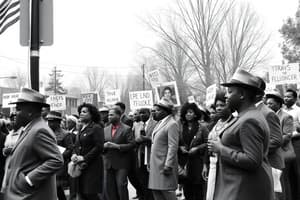Podcast
Questions and Answers
What were Jim Crow laws?
What were Jim Crow laws?
- Laws promoting economic equality
- Laws denying African Americans basic social rights (correct)
- Laws established during Reconstruction
- Laws supporting African American rights
Who were the Redeemers?
Who were the Redeemers?
Southern Democrats wanting to restore white supremacy.
A fee of several dollars that had to be paid before a person could vote is known as a ______.
A fee of several dollars that had to be paid before a person could vote is known as a ______.
Poll Tax
What was the purpose of the Literacy Test during the Jim Crow Era?
What was the purpose of the Literacy Test during the Jim Crow Era?
The Grandfather Clause restricted voting to those whose grandfathers had voted before 1867.
The Grandfather Clause restricted voting to those whose grandfathers had voted before 1867.
What happened during the Wilmington Insurrection?
What happened during the Wilmington Insurrection?
What was the significance of Plessy v. Ferguson?
What was the significance of Plessy v. Ferguson?
What does 'Separate but equal' refer to?
What does 'Separate but equal' refer to?
Who was Sam Hose?
Who was Sam Hose?
What did Ida B. Wells advocate against?
What did Ida B. Wells advocate against?
What is 'Birth of a Nation' known for?
What is 'Birth of a Nation' known for?
Flashcards are hidden until you start studying
Study Notes
Jim Crow Laws
- Enforced racial segregation and disenfranchisement from the late 19th century until the mid-20th century.
- Denied African Americans basic rights, including voting, civil liberties, and access to equal services.
The Redeemers
- Southern Democrats aiming to restore white dominance in the post-Reconstruction South.
- Advocated for "home rule" to replace federal military control ("bayonet rule").
Poll Tax
- Required payment before voting, creating barriers for African Americans and impoverished individuals.
- Used extensively in Southern states to suppress black voter registration.
Literacy Test
- Assessments designed to limit voting access for African Americans and poor whites.
- Tests could be applied selectively, further entrenching disenfranchisement, later prohibited by the Voting Rights Act of 1965.
Grandfather Clause
- Law allowing individuals to vote only if their grandfathers had voted prior to 1867.
- Primarily targeted African Americans, keeping many excluded from the electoral process.
Wilmington Insurrection
- 1898 coup led by white supremacists in Wilmington, North Carolina, resulting in violence against the black community.
- Overthrew the legitimate local government and led to the deaths and displacement of hundreds of African Americans.
Plessy v. Ferguson
- Supreme Court case in 1896 that upheld racial segregation under the "separate but equal" doctrine.
- Rooted in a challenge by Homer Plessy, who was arrested for sitting in a whites-only train car.
Separate but Equal
- Justified segregation under the guise that separate facilities for blacks were adequate and equal to those for whites.
- Provided a legal foundation for Jim Crow laws until the mid-20th century.
Sam Hose
- African American laborer who was lynched in Georgia in 1899 after killing his boss in self-defense.
- His horrific execution reflected the brutal nature of lynching in the South and the widespread societal acceptance of racial violence.
Ida B. Wells
- African American journalist and civil rights advocate born to former slaves.
- Fought vigorously against lynching and was a prominent figure promoting civil rights and women’s suffrage.
Birth of a Nation
- 1915 film that depicted the Civil War and the rise of the Ku Klux Klan.
- First feature-length film to use innovative techniques but reinforced negative racial stereotypes and glorified white supremacy, serving as potent propaganda.
Studying That Suits You
Use AI to generate personalized quizzes and flashcards to suit your learning preferences.




